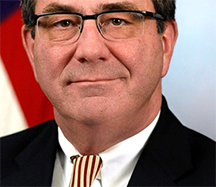BAGHDAD/WASHINGTON (Reuters) – Islamic State poured more fighters into Ramadi as security forces and Shi’ite paramilitaries prepared to try to retake the Iraqi city, while Washington scrambled yesterday to reassure Baghdad after a US official’s sharp criticism of Iraqi forces.

US Vice President Joe Biden spoke to Iraqi Prime Minister Haidar al-Abadi after Defense Secretary Ash Carter questioned Iraqi troops’ will to fight when Ramadi fell. The US damage-control effort came as the loss of Ramadi and Palmyra in Syria put its strategy against Islamic State into question.
“The vice president recognized the enormous sacrifice and bravery of Iraqi forces over the past eighteen months in Ramadi and elsewhere,” the White House said in a statement about Biden’s call with Abadi.
“The United States will … do all we can to help the brave Iraqi forces, including the tribes of Anbar, secure the province from ISIL terrorists,” a senior US official said separately, referring to the group by an acronym.
The insurgents reinforced Ramadi yesterday, deploying fighters in preparation for battle against security forces and paramilitary groups advancing on the provincial capital, 110 km (70 miles) northwest of the capital, Baghdad.
Iraqi forces have regained ground east of Ramadi since launching a counter-offensive on Saturday, a week after it was overrun, and yesterday retook a rural area south of the city.
In comments to CNN on Sunday, Carter knocked Iraqi forces for being unsuccessful in holding Ramadi despite being more numerous than the militants, drawing a rebuke from Abadi, who told BBC the US defense chief had been misinformed. Abadi predicted Iraqi forces would take back Ramadi “in days.”
In Palmyra, the Syrian air force struck at buildings captured by the Sunni militant group, whose arrival has raised fears that the city’s famed Roman ruins will be destroyed.
The air force levelled Islamic State “hideouts” and killed a large number of its members around Palmyra’s military air base, Syrian state media said.
Islamic State has killed at least 217 people execution-style, including children, since it moved into the Palmyra area 10 days ago, according to the British-based Syrian Observatory for Human Rights.
Police sources said Iraqi forces supported by Iran-backed Shi’ite militia and locally recruited Sunni tribal fighters had retaken parts of al-Tash, 20 km (12 miles) south of Ramadi.
Pro-government Sunni tribal fighters, with the help of the army, laid land mines to reinforce their defensive lines around Baghdadi, a settlement northwest of Ramadi that controls access to a major Iraqi air base. Islamic State attacked Baghdadi with seven suicide car bombs on Sunday.
In Ramadi, residents said trucks carrying Islamic State fighters arrived on Sunday evening.
Abu Saed heard a commotion outside his house in the city’s southeastern Officers neighbourhood. “I saw two trucks pull up outside with dozens of fighters carrying arms running quickly into nearby buildings and taking cover.”
Another resident said at least 40 fighters had jumped out of three trucks that arrived in the southern al-Tamim district on Sunday evening.
“They were carrying weapons and wearing mostly khaki dress with ammunition belts wrapped around their chests,” said Abu Mutaz. “They were talking in an Arabic dialect, they were not Iraqis.”
The seizures of Ramadi and Palmyra were Islamic State’s biggest successes since a U.S.-led coalition launched an air war against it last year.
The near simultaneous victories against the Iraqi and Syrian armies have forced Washington to examine its strategy of bombing from the air while leaving fighting on the ground to local forces.
One analyst said the US defense secretary’s remarks suggested the White House realized a change in policy was needed. A spokesman for Abadi dismissed Carter’s comments as “untimely and surprising at a time when Iraqi security forces are preparing to launch a counter-offensive to retake Ramadi”.









